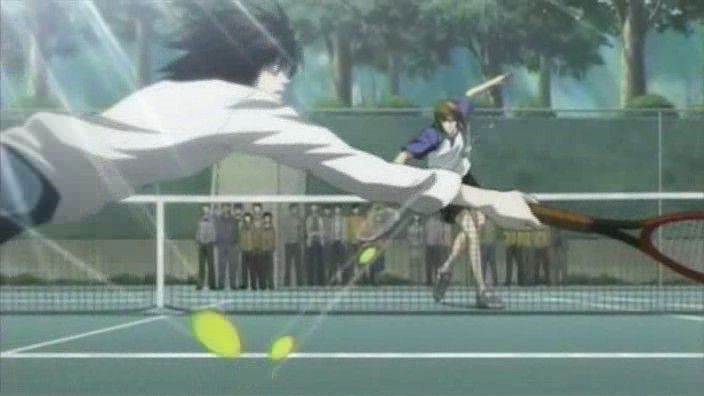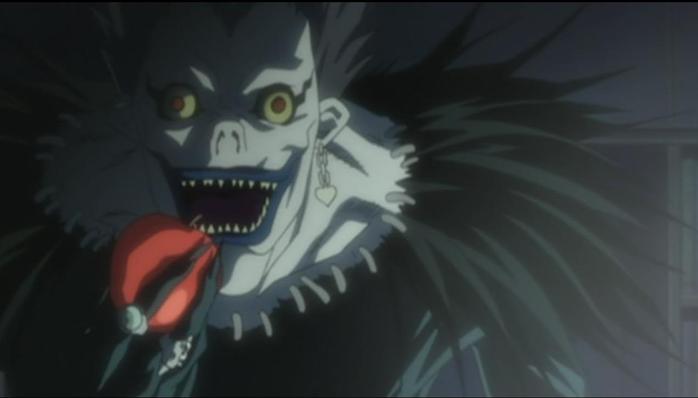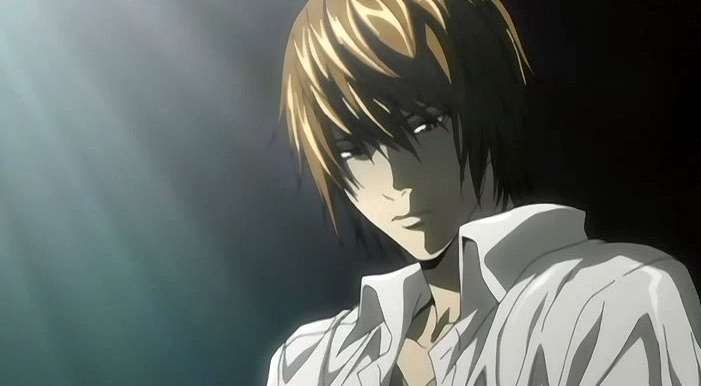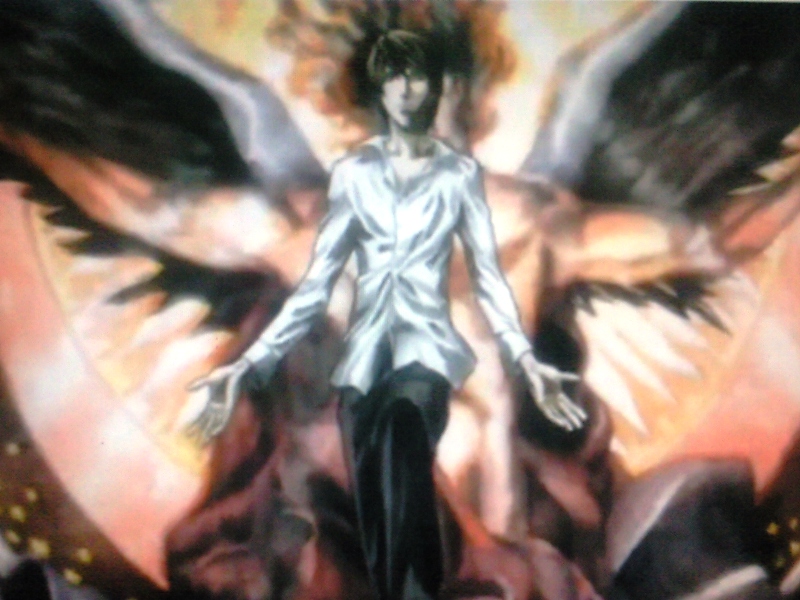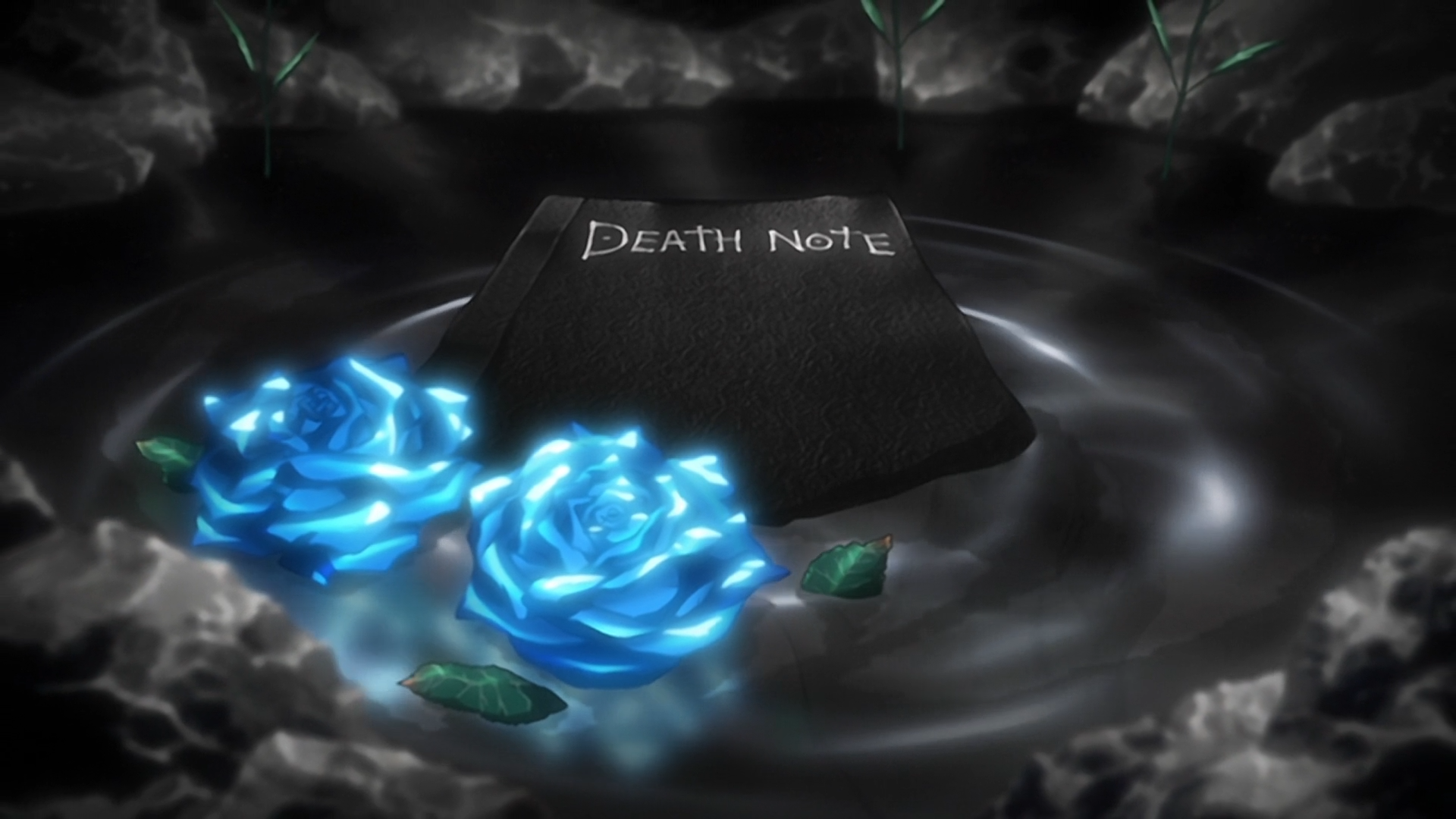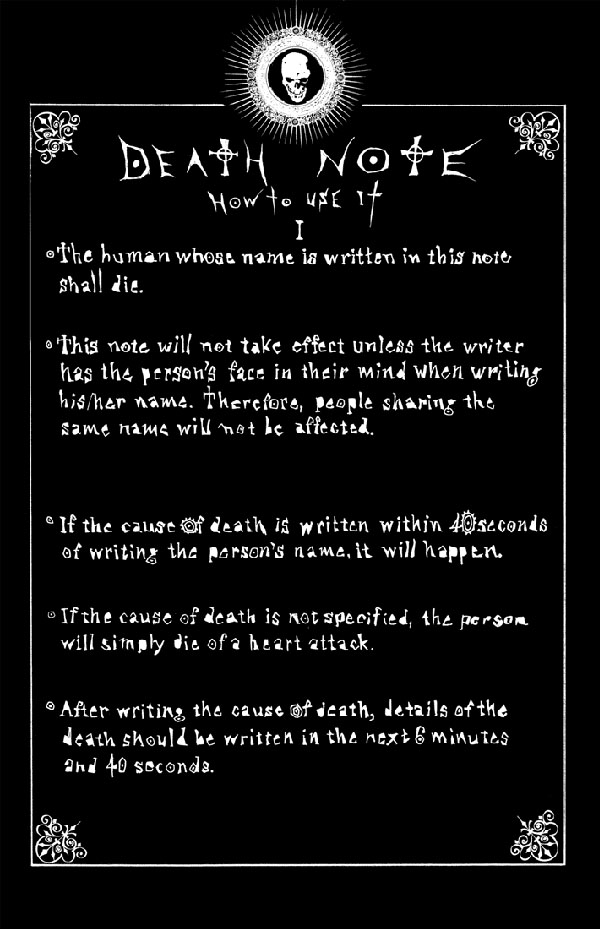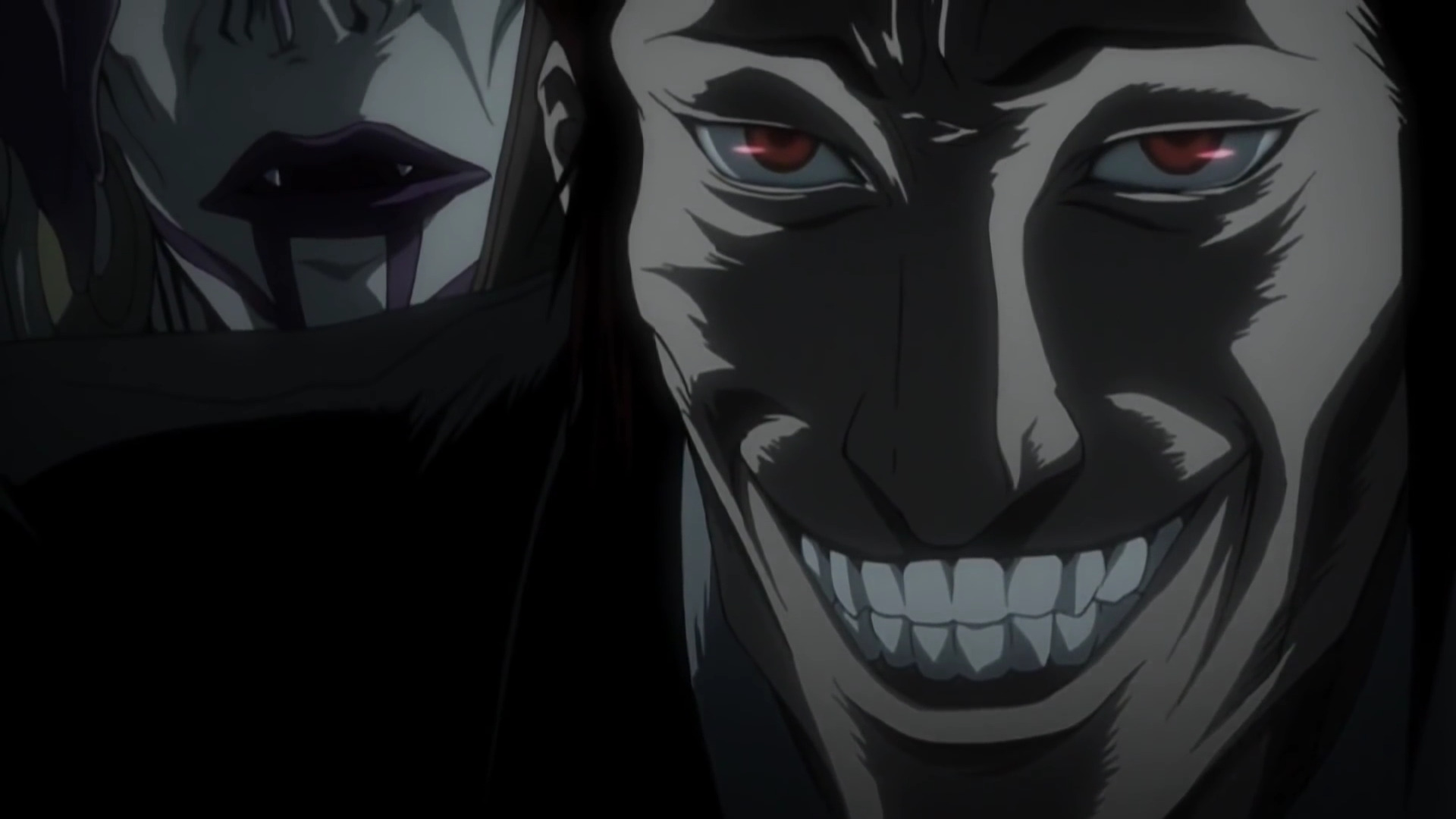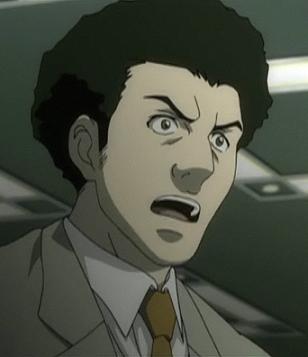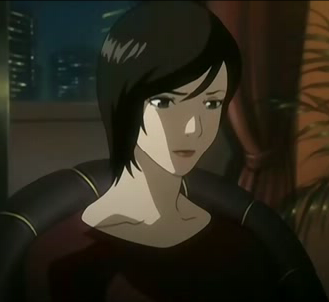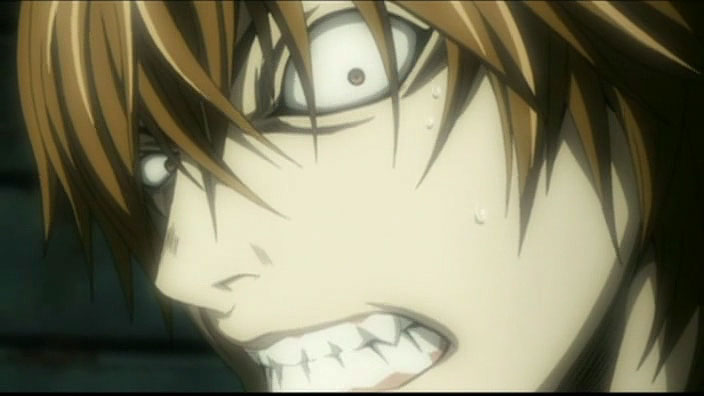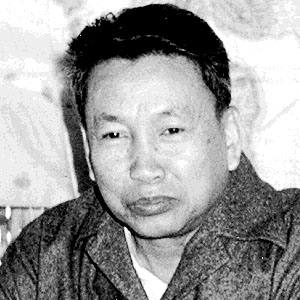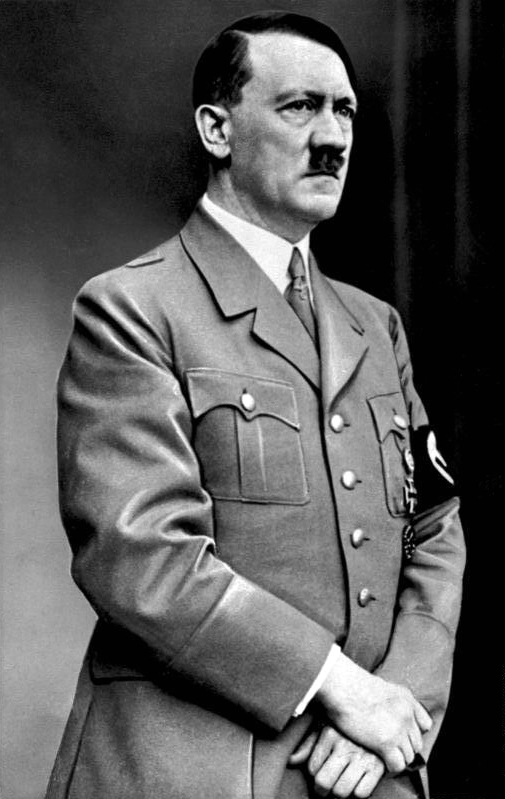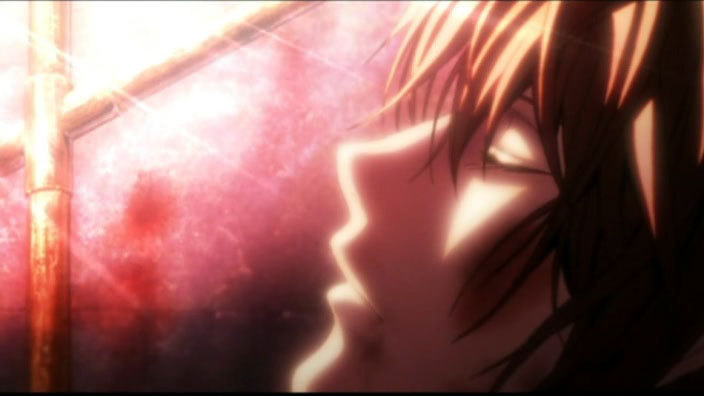I can safely say that I've never seen an anime series that I can 100% recommend to anyone and everyone. Granted, I haven't seen Cowboy Bebop yet, but that's for another time. It's not for lack of good animation; goodness gracious, even the very worst anime puts most American cartoons to shame as far as animation is concerned. But, if the shows I've seen are representative of most anime, Japan seems to ascribe a certain ethos to anime that ends up complicating matters, to say the least. With most American animation, intention rarely goes beyond cheap humor or action. Anime is insistent upon delivering some kind of message, a characteristic that I wholeheartedly endorse. Yet not every message works...
Especially when said "message" is morally repugnant, insulting to human dignity, and hateful. Such is the message of Tetsugumi Obha's Death Note.
If my readers have not at least heard of Death Note, then I'll provide a brief history. Death Note is a manga series, written by Tetsugumi Obha, serialized in the shonen anime magazine, Weekly Shonen Jump. (For the record, shonen just means that said material is targeted for male viewers.) The series got popular enough that Madhouse Inc, one of the powerhouses of the shonen anime scene, decided to turn it into an anime. The series ran in America from 2007-2008, rapidly developing a cult following and becoming one of the most famous anime series in the Western world. The show revolves around a "Death Note," a book that has the ability to kill anyone and everyone whose name is written within its pages. A child prodigy named Light Yagami finds this Death Note and uses it to kill off the world's criminals. A battle of wits ensues between Light and L, an investigator who is trying to put an end to Light's murders.
I watched Death Note all the way through for three reasons. One: it has very good dialogue. I will grant it that. Two: it has a strong sense of suspense. Three: it is of sufficient esteem that it has become a central part of Japanese animation culture. Not watching Death Note, at the time of my viewing, felt like not watching The X-Files; it's not a series one can skip over if one wants to be well-versed in popular media. Now, I realize that Death Note is a terrible series that no one should watch; it has many, MANY deplorable elements preventing any critical viewer from possibly enjoying it. Critical acclaim or no, Death Note is a poorly conceived and created excuse for entertainment, an experience I wholeheartedly regret, an experience I hope to dissuade any other potential viewers from undergoing. I will be spoiling the ENTIRE anime in this top ten, so to further dissuade people from watching. If you decide to stop reading now and go watch the show, I cannot stop you. All I can say is that you are wasting precious hours you could be spending on something more valuable.
These are the top ten reasons I hate Death Note.
Number Ten
The BORING AnimationThe above image is Death Note's animation at its very best. Keep in mind that Death Note has little, if anything, to do with tennis.
As far as pure artistry is concerned, Death Note has adequate background art and decent character designs. L, the only character in the show with any degree of good characterization, has a very interesting design, using massive eye size (relative to everyone else) in order to offer the illusion of inhumanity and social distance. The rest of the character models, though, leave a lot to be desired. Light Yagami is just a standard "good-looking" anime male, with none of his animation elements expanding upon the subtleties of his character. Of course, that would suggest that he has subtleties to his character, but, again, I digress.
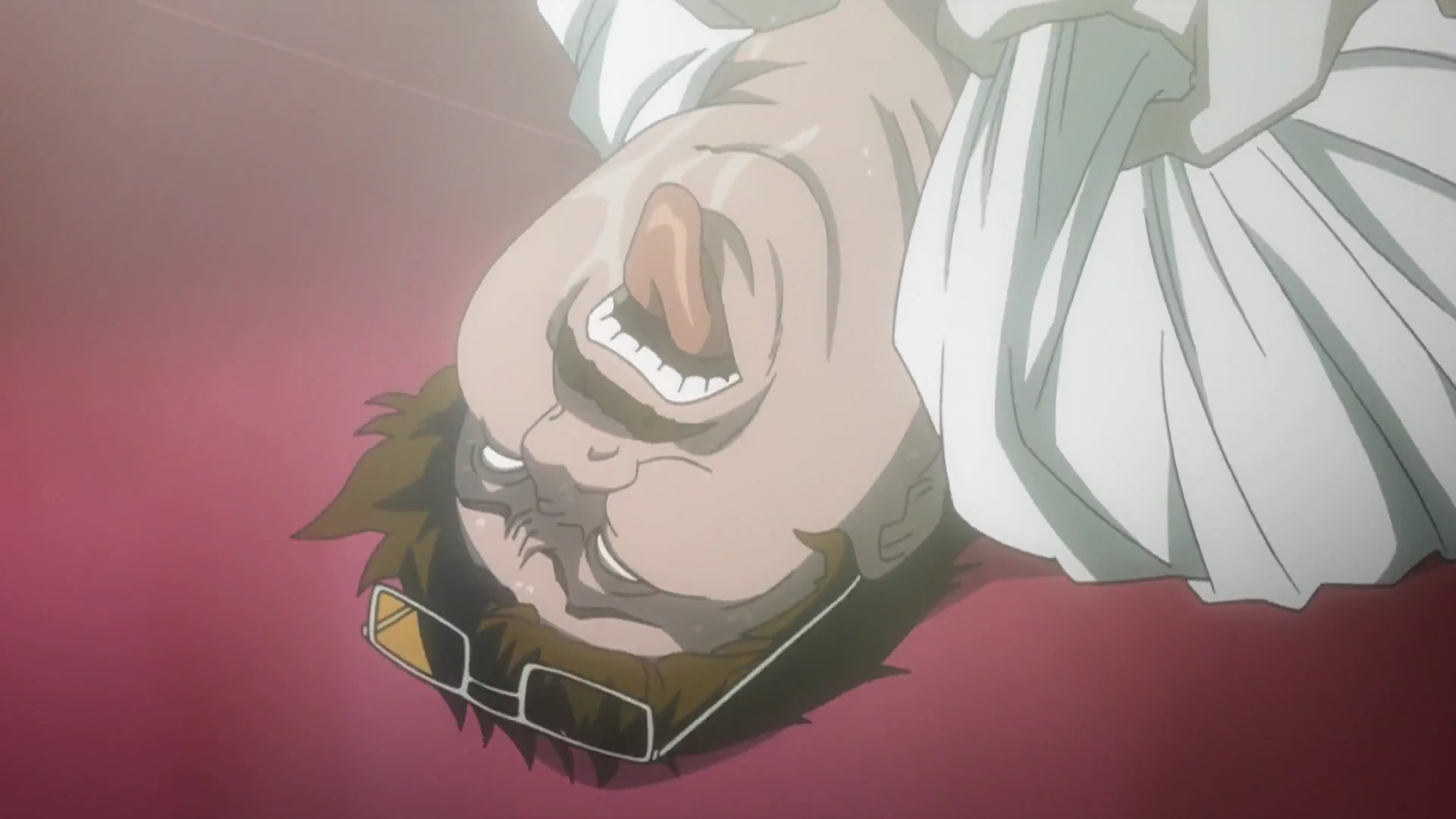 |
| The last time I checked, people don't stick their tongues out when they're having a heart attack. |
To be fair, Death Note has some nice backgrounds and uses lighting competently. It's a shame that most of these elements are ruined by...
Number Nine
The OBVIOUS and/or MEANINGLESS SymbolismOK, look at the above image. That monster that looks like the lovechild of The Joker and Kefka from Final Fantasy VI is a Shinigami, the Grim Reapers of the Death Note universe. This one is eating an apple, a clear allusion to the importance of apples in both Greco-Roman and Judeo-Christian religions. In both cases, it's a suggestion of sin and evil, be it the fruit from Eden's Tree of Life and/or Tree of Knowledge of Good and Evil (there's still a debate as to whether or not there's two trees, but that's a subject for another blog) or the infamous Apple of Discord that kicked off the Trojan War. This is the most subtle symbol used in the entire show... and it has no bearing on the greater themes. Since the Shinigami is the one that eats the apple, there's no reflection on either Light or L. The apples have nothing to do with the humans, who, at the end of the day, are the only characters we are supposed to care about. Apples are never used to convey a greater point about a character's moral stature (in the animators' eyes at least). Thus, their symbolic value ends up tarnished.
The other symbols in the show, however, are much worse.
As one can clearly see, a heavenly light is shining upon Light. This means that he is being looked down upon from the heavens, equating him with a divine being. The only way one could get more overt with the symbolism would be to take Light and put him in front of a stained glass window.
I may have spoken too soon...
Last but not least, here's my "favorite" example of bad symbolism in the show.
See? Light has red hair, but L has blue hair. This means that they are opposites and have differing opinions on big issues like "justice." The two are bound to be enemies. The only way one couldn't understand this symbol is if one was comatose.
If a symbol is obvious or meaningless, it isn't worth inclusion. In fact, not including a symbol often forces the viewer to question whether there are symbols or not. Sometimes those symbols we discover that weren't even meant to be symbols are more meaningful than the most excruciatingly planned symbols in the creative process. Symbols should be used as subtle devices, not overt ones. In short, if Death Note wanted to be pure entertainment, it created half-assed symbols that only served to waste the viewer's time. If Death Note wanted to be "high art," then it failed to, formalistically, compare to the greater works that have come before it. Taking the first two issues into account, one can see why I dislike this show as a visual medium.
As for its status as an auditory medium...
Number Eight
The GODAWFUL Music
I cannot say the same for "L's Theme," which is so clearly based around Mike Oldfield's "Tubular Bells" that the song definitely feels plagiarized. The proof can be found in this cheaply made YouTube video, though I'd personally suggest playing the two songs side by side, using the original Mike Oldfield recording as opposed to The Exorcist remix that this YouTuber uses. "Light's Theme," on the other hand, is the best theme in the show, using the right mixture of King Crimson-inspired flange and piano to create a truly ominous ambience. This is the one song from Death Note that I would actually recommend people to seek out.
But the real reason this category exists is the opening theme music. Like most anime series, Death Note has a new opening theme for each season of the show. To give the first theme a bit of credit, the translation of the lyrics actually does relate to the show. Unfortunately, this is undermined by the needlessly bright and happy vocals. The song is too hyper to really evoke the main ambience of Death Note, a show that tries to be a grim neo-noir, aesthetically. The writers should have taken their cues from The X-Files or Law and Order before using this as the opening theme.
And then there's the second theme song.
Granted, there's ending theme music as well. I didn't really listen to it, because I skipped to the next episode after one ended. I won't say these ending themes were bad, but I will say that terrible opening theme music incentivizes a viewer to not sit through the end credits. If you are so inclined, you can track these themes down, but I am not going to waste your or my time any further.
Number Seven
The Failure to Capitalize on the GOOD Elements of the Show
So, the above image details exactly how Death Note's main plot device works. The Death Note ensures the death of the victim so long as the user has the face and the name of a potential victim in mind. It has to be the victim's real name, so having an alias is the primary defense against death. To its credit, Death Note uses this rule to its fullest. They even expand upon this with the "Shinigami Eyes," which enable the user to learn someone else's name automatically but at the cost of half of one's remaining lifespan. This produces a lot of genuinely creative situations, allowing the show to use its ever flexible writing to its fullest.
But, if one looks at some of the other rules of the "Death Note," one realizes that there are so many other uses that this "Death Note" could have. For instance, "if the cause of death is written withen 40 seconds of writing the person's name, it will happen." Throughout the show's span, Death Note capitalizes upon this rule very few times, only two of which are creative whatsoever. As long as a death is within the laws of physics, the death can and will happen. Hit on the head with an anvil? OK. Impaled by a sword. Good to go. As long as the situation is feasible, the death can happen. The non-heart attack deaths that Death Note actually uses are relatively banal and dull. In my opinion, the show needed to take advantage of the opportunities its premise presented. The use of "more creative deaths" wouldn't only allow for some variety in the animation; it would allow the audience to see just how twisted and psychotic Light is becoming (more on that later). The show could even attempt some black comedy by killing off universally disliked characters in highly over-the-top and ludicrous ways.
To me, the failure to use the "Death Note" properly is a small but significant flaw in the grand scheme of the show. It might not be as glaring a problem as the weak music and animation, but it's ultimately a flaw that more drastically affects the plot, wherein we find most of Death Note's flaws. Including...
Number Six
The INCONSISTENT Tone and Pacing
In this section of the review, I will be formally spoiling the entire plot of Death Note. If, for some God forsaken reason, you still want to watch this show despite making it this far into my rant, I suggest that you skip to the more critical points after this part of the countdown. As for those sticking around for this point, let's break down the plot of the entire show.
Light Yagami, under the guise of an enigmatic figure named "Kira" ends up possessing the first "Death Note," going on a crusade to kill the world's criminals. L, the world's best detective, learns of these murders and sets up a task force to bring in "Kira." Light kills off many agents but lays low when L starts to figure him out. A wrench is thrown into the mix when a fan of Light, Misa Amane, gets a "Death Note" of her own and starts killing people as well. Light eventually brings Misa under his control, only for L to deduce both of their identities. In order to hide the truth, Light induces amnesia using one of the minor rules of the "Death Note," entrusting the note to a greedy businessman named Higuchi, the gentleman with the troll face pictured above. For several episodes after this point, L and the memory-wiped Light join forces to bring Higuchi down.
I will compliment the pacing of the first part of the show, particularly the events prior to Higuchi's gaining the Death Note. The escalation of L's investigation coupled with the increase in Kira's murders does produce the appropriate amount of tension. Nothing feels rushed or forced. It's only when Misa is introduced that things start to get wonky, with L capturing the two in relatively short order after the two ally. The pacing gets more erratic after Light loses his memory, as the show takes an extremely long time to reveal Higuchi as the new "Kira" yet relatively little time to take Higuchi down. The build-up is fine, but the pay-off is deeply unsatisfying. These pacing issues are also a huge detriment to Higuchi's character, as he comes across as more of a stereotypical evil businessman/generic anime psychopath than anything else. He's a character we've seen before, from Patrick Bateman in American Psycho to Solf J. Kimblee in Fullmetal Alchemist/Fullmetal Alchemist: Brotherhood.
Also, though the pacing is relatively focused, the tone is not. In the early parts of the show, it appears as if Death Note is going to be a neo-noir of sorts, and the detective elements of the show certainly add to this mystique. But, once more mystical elements are added to the show, like the highly plot convenient amnesia, the tone gets muddled. By the time we enter the "Higuchi cycle," Death Note ceases to be a noir and turns into a buddy cop show. The contrast is glaring, and the aesthetic of the show gets muddled. Also, the addition of Misa to the main cast leads to some particularly awful comedy, as if the show couldn't get further from its origins.
But that's only half the story. Soon, Light gets his memory back and starts killing people again. His chief target: L. Spoilers: he succeeds. To compensate for the tremendous loss to the cast, the creators throw in two new characters to fight against Light: Near, a note-for-note copy of L, and Mello, an intellectually gifted terrorist who is willing to go to any lengths to stop Light. At the same time, Light gathers his own allies: news anchor Kiyomi Takada and fellow psychopath Teru Mikami. In a drawn-out and tedious three-way feud, Near ends up on top, capturing Light. Light, realizing the jig is up, finally gives into his inner psychopath and ends up being killed. The end.
The final arc of Death Note is widely disliked on the Internet and for good reason. After L is killed, the entire dynamic of the show is drastically changed. One can't simply replace L with another genius and expect the show to work the same way. Sadly, the introduction of Near implies that the producers thought they could continue the same shtick without any narrative consequences. Putting it shortly, the technique doesn't work. Near is not L. To his credit, L has a lot of very strong characterization in the beginning of the show. Near does not. Near is boring. Since the conflict of the show has no real driving force, the pacing of the show goes slack and plot points take ages to develop. As the audience no longer cares about the characters involved in the story, each episode feels like another exercise in tedium. Tonally, the show feels as if a cheapened, lackluster version of its former self. The ending in particular, to many, is a massive disappointment, as Light and other characters break identity completely in order to satisfy the demands of the plot/series finale.
Most Death Note fans tend to ignore issues like this, as they are so engrossed in the show that pacing no longer matters. But this is mostly a warning to new viewers. All I will say is this: if inconsistency in pacing and tone are enough for many viewers to discount watching Lost, Dexter, and Angel, why does Death Note get a free pass?
In this section of the review, I will be formally spoiling the entire plot of Death Note. If, for some God forsaken reason, you still want to watch this show despite making it this far into my rant, I suggest that you skip to the more critical points after this part of the countdown. As for those sticking around for this point, let's break down the plot of the entire show.
Light Yagami, under the guise of an enigmatic figure named "Kira" ends up possessing the first "Death Note," going on a crusade to kill the world's criminals. L, the world's best detective, learns of these murders and sets up a task force to bring in "Kira." Light kills off many agents but lays low when L starts to figure him out. A wrench is thrown into the mix when a fan of Light, Misa Amane, gets a "Death Note" of her own and starts killing people as well. Light eventually brings Misa under his control, only for L to deduce both of their identities. In order to hide the truth, Light induces amnesia using one of the minor rules of the "Death Note," entrusting the note to a greedy businessman named Higuchi, the gentleman with the troll face pictured above. For several episodes after this point, L and the memory-wiped Light join forces to bring Higuchi down.
I will compliment the pacing of the first part of the show, particularly the events prior to Higuchi's gaining the Death Note. The escalation of L's investigation coupled with the increase in Kira's murders does produce the appropriate amount of tension. Nothing feels rushed or forced. It's only when Misa is introduced that things start to get wonky, with L capturing the two in relatively short order after the two ally. The pacing gets more erratic after Light loses his memory, as the show takes an extremely long time to reveal Higuchi as the new "Kira" yet relatively little time to take Higuchi down. The build-up is fine, but the pay-off is deeply unsatisfying. These pacing issues are also a huge detriment to Higuchi's character, as he comes across as more of a stereotypical evil businessman/generic anime psychopath than anything else. He's a character we've seen before, from Patrick Bateman in American Psycho to Solf J. Kimblee in Fullmetal Alchemist/Fullmetal Alchemist: Brotherhood.
Also, though the pacing is relatively focused, the tone is not. In the early parts of the show, it appears as if Death Note is going to be a neo-noir of sorts, and the detective elements of the show certainly add to this mystique. But, once more mystical elements are added to the show, like the highly plot convenient amnesia, the tone gets muddled. By the time we enter the "Higuchi cycle," Death Note ceases to be a noir and turns into a buddy cop show. The contrast is glaring, and the aesthetic of the show gets muddled. Also, the addition of Misa to the main cast leads to some particularly awful comedy, as if the show couldn't get further from its origins.
But that's only half the story. Soon, Light gets his memory back and starts killing people again. His chief target: L. Spoilers: he succeeds. To compensate for the tremendous loss to the cast, the creators throw in two new characters to fight against Light: Near, a note-for-note copy of L, and Mello, an intellectually gifted terrorist who is willing to go to any lengths to stop Light. At the same time, Light gathers his own allies: news anchor Kiyomi Takada and fellow psychopath Teru Mikami. In a drawn-out and tedious three-way feud, Near ends up on top, capturing Light. Light, realizing the jig is up, finally gives into his inner psychopath and ends up being killed. The end.
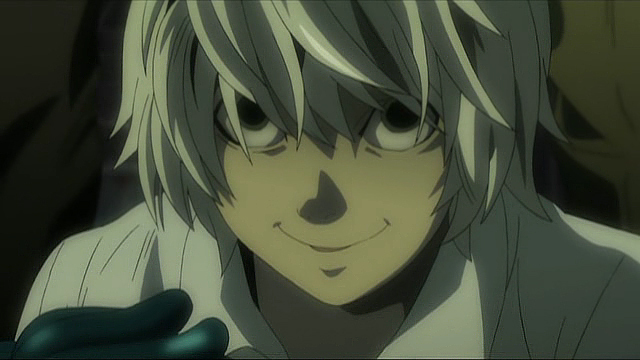 |
| Stop smiling. Nobody likes you. |
Most Death Note fans tend to ignore issues like this, as they are so engrossed in the show that pacing no longer matters. But this is mostly a warning to new viewers. All I will say is this: if inconsistency in pacing and tone are enough for many viewers to discount watching Lost, Dexter, and Angel, why does Death Note get a free pass?
Number Five
The TRITE MessageAs I described above, most anime contain some kind of moral message or philosophy that they want to impart to the viewer. Often times, these messages are extremely complex and warrant multiple viewings. Fullmetal Alchemist's discussion of equality and humanity leads to some pretty poignant moments, as in the traumatic "Night of the Chimera's Cry." By the same token, Code: Geass offers some salient points on the nature of power and control, exploring the destructive tendencies of those who use these things to exploit others. What does Death Note have to offer?
"If you somehow get the capacity to kill large numbers of people, don't use it. It's wrong."
Thank you for pointing out the obvious, Death Note. Seriously, is this supposed to be the grand message of Death Note? For all its talk of "justice," the morality of Death Note is very black and white. Light is evil, the blood of his victims literally drawn onto his face. L and his allies are good; they might show sociopathic tendencies, but they are fighting for the good of mankind. There's nothing more to this moral; the decision is obvious to anyone who has a functioning mind. Where is the debate? Where is the complexity? Where is the non-obvious message? I can honestly learn more about the world through using my common sense than the message found in Death Note.
If one is to construe the theme to its most complex state, one could call Death Note a criticism of US actions against Japan during WWII, namely, the use of the atomic bomb. The argument: no one, no nation should ever have the capacity to wipe out so many people at once. While said message is strong in its conviction, it is ultimately shallow in its execution. We never see the complex motivations that go into the decision to use a weapon of mass destruction, nor do we see the real impact that it has on those who use it. Light gets the note, starts killing people, and that's that. He's never haunted by his decisions, nor does he ever experience any doubts. Likewise, L never loses faith in his convictions that what Light is doing is wrong (as he should). There's no mechanism by which the audience can really question the ethics of either side. One is obviously good. One is obviously evil. There is no grey. Thus, Death Note's message is tantamount to a basic lesson one could learn from an Aesop's fable. Hell, even one of Aesop's fables is more subtle with its theming than Death Note.
The key thing Death Note lacks is thematic sophistication. There's nothing really complex about it at all, despite what fans seem to say about it. And there's one other element of Death Note that is radically overhyped, one which I have even more problems with...
Number Four
Light Yagami Is a TERRIBLE Villain
Ever since Death Note's conclusion, Light Yagami has been cited as one of the best villains in the anime canon. Many laud his descent into madness and his transformation into one of anime's most accomplished serial killers. Some even consider Light an anti-hero, what with his quest to kill the world's criminals being full of good intentions. People seem to like every single element of his character: his intellect, his dialogue, his motivations, his nefariousness, his complexity. He's a villain so beloved that many people actually want him to win.
I find it very difficult to take any of these laudatory claims seriously.
My main issue with Light is his absolute lack of passion. Since he possesses a James Moriarty-like intellect, every single one of his actions is painstakingly thought out. He never makes mistakes (at least, until the tonally dissonant ending). He never shows emotion. He single-mindedly pursues his goal without taking any time to enjoy it. Needless to say, such behavior does not make for a particularly entertaining or likeable villain. Unlike similar villains from the same mold, Light is never "fun" to watch. I won't act as if Envy from Fullmetal Alchemist or The Major from Hellsing: Ultimate are particularly deep or complex villains on par with Norman Bates or Michael Corleone, but they are at least entertaining. Light just goes about his day, writing names into a notebook and ranting about how he will be a god. He's not likeable; he's just an arrogant, elitist prick.
Perhaps I'm missing the point. Maybe Light is supposed to be more interesting in his fall rather than in the psychopath he is to become. I'd be willing to accept this criticism if Light weren't clearly a psychopath prior to the start of the main plot. People say that Light falls from grace, but it is very apparent that he is a seriously disturbed youth from the show's first episode. He is unable to form genuine friendships; he has a nihilistic worldview; he is emotionally detached from everything. He's the kind of student one would expect to be a serial killer later in life. Also, one recognizes his insanity when he so much as picks up the "Death Note" in the first place. Why on earth would a top student leave in the middle of class to pick up some random notebook that fell to the ground outside the classroom? It makes no sense. Also, once Light starts killing criminals, there is no change to his personality. Since Light was already disturbed, we are not fazed by his murders. He never actually changes. His motivations are as boring as they come, as his desire to kill the world's criminals is pretty infantile when one gets down to it. Light is just a child trying to play God; he's not a moral crusader. Plus, he monologues about his mission with such lack of passion as to further hammer home the point that he is just a psychopath.
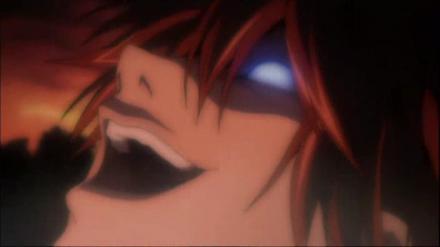 |
| "Make 'em laugh, make 'em laugh, make 'em laugh!" |
Many people dislike the ending of Death Note, saying it is wholly out of line with Light's character. Personally, the last episode of Death Note is actually one of the better ones. It's the only episode in which Light actually changes. He's been discovered. The "Death Note" is no longer in his possession. He does not know the real names of the people around him. He is well and truly trapped. It comes, then, as no surprise that he'd launch into a maniacal monologue about how he is the morally correct figure in all of this. It's the one time in Death Note that Light becomes the cheesy anime villain that we are hoping for. He laughs maniacally; he rants about moral absolutes to a crowd that does not accept his bull****. Moments like this are fun, and it feels honestly cathartic when Light is shot by the police for his many, many crimes against humanity.
There's the term "so bad, they're good" that we often ascribe to villains. While the very best villains are praised for their complex characterization, others are considered good purely on how much fun they have as villains. Light's greatest sin as a villain is his failure to enjoy himself. Unlike a Joker, a Kefka Palazzo, a Raul Silva, or a Lelouch vi Britannia, he does not take any pleasure in his evil. It's this stoicism that ultimately destroys his credibility as an antagonist we are supposed to like. He tries far too hard to be a god among men, ultimately becoming less interesting because of it.
Number Three
The HATRED of the Common ManThe image you see above is my favorite character in Death Note, Mr. Aizawa. He's a slightly above average cop who manages to survive the events of the show, contributing to the investigation in small but meaningful ways. Most of his victories are either minor or Phyrric, but they are victories nonetheless. He fears for his family, but he's devoted to his work and actual justice. He has his moments of doubt, but he ultimately never loses his moral convictions. He's easily the most likeable character on the show, as he is arguably the most human figure in the entire anime.
It is unfortunate, then, that men like Aizawa end up constantly thrown to the side in this show. For Death Note seems to believe in the average man's inability to do anything against an übermensch. Aizawa and the other police officers stand no chance against Light; every time they try to outsmart him, they end up thwarted and humiliated. They need to have their own übermensch: L. Then, when L dies, he must be replaced by a different übermensch: Near. It's as if the forces of good and evil are wholly at the fingertips of the supermen and no one else. All the while, the "ordinary" characters in this show are regularly used as pawns; they have no free will, being used as mere pieces on a wei qui board.
Perhaps this is supposed to be a warning from Obha and the other creators of Death Note: the various übermensches in control of society's upper echelons are controlling us like puppets. It's a noble thought, but one that doesn't hold up to scrutiny. If Obha were trying to make that point, then he would have had Aizawa be the person that ultimately takes Light down, not Near. As it stands, Aizawa is the only Japanese investigator who ends up being half-competent. Even worse, when he seeks to do more, Near tells him no, as he's not smart enough to deal with Light. It's a complete smack to the face, as Aizawa has a competent intellect and a bravery that Near completely lacks. Near faces no consequences for carelessly discarding his most valuable asset, as he already has the ability to defeat Light with the help of his fellow übermensch, Mello. Such attitudes indicate that Aizawa and the other "normal" characters on the show are essentially useless and have no relevance to our story. They are background that, for all intents and purposes, should be ignored. By extension, in the real world, the average man should be ignored in favor of focusing on the conflict between supermen. They are the only ones that matter to Obha and the other creators of Death Note.
What I hate most about this theme is the insinuation that the average man has no role or significance in the broader universe. All the victories of Aizawa and the other investigators are inconsequential to Death Note's plot. However, in reality, the actions of the "average man" can end up reshaping the world. What can we say about the messenger who dropped General Robert E. Lee's battle plans at The Battle of Gettysburg? What of the man who stood in front of a line of tanks at Tiananmen Square? The man who fired the "shot heard round the world?" The various "average" civilians providing Twitter coverage of the Arab Spring? These "normal" people reshaped the world as we know it. As Tolstoy described, the universe is a network of infinite causes, and each major event that happens is the universe is the product of thousands of thousands of decisions. While chaos and complexity theory does offer mathematical insight as to the relative importance of some phenomena over others, one cannot deny that the smaller causes have, at the very least, some impact. For Obha and the creators of Death Note, the minor characters are completely insignificant to the narrative of the show. Ultimately, the attitude the show expresses towards the "average man" is disdainful and even somewhat hateful.
But, as much as Death Note hates men, that doesn't even come close to...
Number Two
The DISGUSTING MisogynySome people who have read my other reviews and have watched Death Note with a critical eye knew this one was coming. Death Note is the most misogynistic, mainstream television series I have ever seen. Now, I am aware that this show targets a male audience, but that does not excuse its patronizing attitudes towards women. In addition, trust me when I say Death Note is misogynist and not sexist: a sexist show would just show women being inferior to men in some activity for another. No, Death Note actively hates women. The show only has two female characters with any relevance, but the two rank as some of my least favorite characters ever.
Meet Misa Amane, a character who...
I'm sorry. Did I call her a character? Let me start over.
Meet Misa AmaneTM, a sex object whom the animators and male characters throughout the series use to push the plot forward. Over the course of her object arc, Misa grows infatuated with Light after he murders the criminal who killed her parents. She acquires a Death Note of her own and starts killing other people who get in Light's way. Once she meets Light, though, she loses any and all agency. She is his eager slave, willing to do whatever he says without question. No matter what terrible thing she has to undergo, she emerges with the same wide-eyed adoration for Light. She might face death, rape, or both at the same time, but she doesn't care. So long as she has Light, nothing else matters. Not helping her objectification is the fact that Misa Amane is an utter airhead, unable to come up with any thought of her own. She is only able to manipulate others when Light guides her to do so. Her sex is used solely as a weapon, and her physical desire for Light has no value in the "relationship" whatsoever, as he dictates whenever she is to be "used."
| One of the most appalling frames in pop culture history |
Also, to add a personal gripe to the mix, Misa has the most annoying voice I've ever heard, barring Chris Tucker. The Japanese voice acting sounds like a baby whining as much as humanly possible.
I've learned that Mr. Obha created Misa Amane in order to break up the monotony of an all-male cast. That should never be one's attitude when creating a character. Characters, men or women, need to feel like people. People have complex identities and motives. What is Misa's identity? A perfect servant for Light. What is Misa's motivation? Serving Light in whatever way possible. The creators do not treat Misa like a person. Her fanaticism combined with her stupidity make her practically inhuman in her devotion; for all intents and purposes, she is a robot, a tool used to satisfy the demands of Light and the plot.
It's easy to call Misa is the worst female character in the show, if not the worst character on the show period. But, being honest, there are times when I think the worst character on the show is actually the other female character: Kiyomi Takada. At the outset, Takada seems like the smarter counterpoint to Misa, an accomplice to Light that isn't a complete bimbo. She's smart, professional; she even holds a position of some authority as Light's chief supporter in the media. Yet, for all her exterior power, Takada is an even greater tool. She is even more emotionally dependent on Light than Misa, if that is even possible. Making matters worse, Light doesn't show any sign of affection for her whatsoever. At least he occasionally went on dates with Misa in order to make her happy; Takada has to be consoled with the false promise that Light will make her "the goddess of the new world." In the very worst part of her character arc, Takada is murdered in order to make sure Light's plan to take over the world is airtight.
In fact, killing and/or brutalizing women in order to enhance male character arcs is very much a constant throughout Death Note. Misa is forced to trade over half her life for the magical "Shinigami Eyes" ability twice during the show. Therefore, at most, she could live 25 years. But, not to worry, Misa need not fear that, as she commits suicide in the show's aftermath. All the women who try to capture Light end up dead, through one reason or another. Mello kidnaps Light's sister in order to coax him out of hiding. Even Light's mother doesn't come away from this show unscarred, as half her family ends up dying because of her son's actions. In the world of Death Note, women are just collateral damage, just bits of debris instead of human beings.
It's quite astonishing that a show of such acclaim as Death Note manages to uphold its reputation despite the hundreds of misogynist moments and concepts contained within it. The women of Death Note are weak, shallow, stupid, annoying, useless, male-dependent, rag dolls who only gain value once they are murdered, very often by their own hands. If that's not indicative of a deep hatred of women, I don't know what is.
And, the worst part? That's not even number one.
NUMBER ONE
DEATH NOTE CELEBRATES MASS MURDER
There are a lot of things to be said about "good intentions." I can certainly understand that most people have them. Indeed, some philosophers argue that no one does anything wrong without having good intentions. And it's clear that Death Note has some good intentions. What was Death Note supposed to be about? It was supposed to be a show about a serial killer, a serial killer whom we are supposed to understand yet despise, and the noble efforts of investigators to take him down in spite of his genius intellect and reign of terror. What is Death Note about, as it is? Death Note is about a genius whose plan to commit global genocide was foiled by dastardly ethical people.Death Note's biggest crime is not the number of murders within it. There are plenty of great works of art that feature disgusting amounts of gore and violence (The Triumph of Death, most of the works of Haruki Murakami, Pulp Fiction). Death Note's biggest crime is claiming that these murders are permissible or "part of a greater good." Death Note believes that Light is the good guy and that we should side with him.
Many readers might be skeptical of this assertion. Is not Light considered one of the best villains in anime (if falsely)? Therefore, how can he possibly be considered a good person on the show? Well, herein comes the matter of Death Note's framing. For the vast majority of the show, Light never indulges in the attitudes that one would expect of a villain. As I said before, this significantly impedes his development as an antagonist. It makes him a formulaic, static character. But such a depiction also indicates that Light is becoming numb to his murders. As he kills more and more people, it becomes more of a day job than an expunging the world of his enemies. There have been plenty of other people who were numb to mass murders. Such people include this one:
This one:
And, let's not forget, this one:
Yes, Light Yagami is as evil as Adolf Hitler. In fact, Light/Kira kills almost as many people (offscreen) as did the Nazis. When depicting the stories of genocidal maniacs and serial killers, any effort to humanize the evil must clearly be used to illustrate why said evil exists. Also, such a depiction should never cast the villainous person in a positive light. To make the point clear, Der Untergang (Downfall), a film that I consider to be one of the best movies of the 21st century, received tremendous criticism for so much as remotely humanizing Hitler. I've discussed why Bruno Ganz's depiction isn't unethical in my review of the film, but the criticism has, at the least, some merit. We shouldn't, as ethical agents, portray genocidal maniacs as "good" people.
Death Note doesn't just frame Light as a good person; Death Note frames Light as a God among men. Take a look at his death, for instance.
This is not the death of someone who is being damned. This is the death of someone who is being lifted up to a godlike status. Light's face is utterly at peace, despite his murdering hundreds of thousands of people. Throughout Death Note's last episode, Light stumbles around with heavenly light constantly shining upon him, as if he is a Christ-like figure in his pursuit to free the world of crime. Everyone else has simply failed to understand him and his "good intentions." As he dies surrounded in the heavenly glow, we are meant to look at him with an attitude of lament, as if the world's hope for salvation from sin has died. Light's death isn't the only moment in which this happens. At various points throughout the show, Light is equated with God and/or heaven. Light surrounds Light. Light is never wholly shown as the bad guy, as the show always offers the suggestion that his concept of "justice" is the right one. The show offers us a choice in whom we can side with. It may be my personal morality clouding my critical judgment, but I feel so much as offering the choice to follow a genocidal maniac is an action that is morally questionable at the very least.
It's not the murders that sickens me; it's not Light's boring character; it's the fact that the animators send the viewers an implicit message that is morally wrong under any grounded moral theory in human existence. Kant wouldn't stand for this. Bentham wouldn't stand for this. Nietzsche wouldn't stand for this. Moses wouldn't stand for this. Yeshua of Nazareth wouldn't stand for this. Muhammad wouldn't stand for this. Siddhartha Gautama wouldn't stand for this. No moral person would condone the adoration of a serial killer. Yet Death Note does.
Perhaps some of my readers think I am looking too deeply into this matter. After all, my claim that Death Note supports Light is based on a background cue and a Longinan concept of formalism (props to you if you know what this last term means). Indeed, even if one accepts my terms, there could be a counter-argument. Maybe Death Note is trying to say that anyone with power over life and death is evil, including God himself. I do not subscribe to this theory for two reasons. One: there is a difference between letting someone die within a world that is predetermined by human free will and action and actively killing someone. Two: if this was the grand plan of Death Note, and if this was the real message Death Note was trying to send, then Obha and the other creators would have made it more explicit. Even if I were to agree with this theory, I could then only recommend Death Note to atheists. As it stands, I cannot recommend Death Note to anyone.
If one needed any proof to show that my theory about Death Note's celebration of murder is correct, one only needs to look at Death Note's fanbase. Just a quick check on YouTube gives us plenty of fan theories of "how Light should have won" or "Death Note's ending sucks because Light lost." There were people who tuned into Death Note wanting Light to win. There are fan sites praising Light as the "God of the New World" that he wants to be. There are people who have adopted his same concept of "kill every criminal who has ever committed any crime ever" mentality. "Light Yagamists," as I like to call them, are some of the most frightening fans I have ever witnessed. In a fanatic fashion, they are praising a serial killer as the paragon of human morality.
The very fact that "Light Yagmists" exist indicates that Death Note fails to do its job. Whenever a villain, whenever a truly terrible person is the focus of a show and/or movie, they must be framed as if their actions are wrong. Consider Michael Corleone of The Godfather. He might have elements we can sympathize with, but at no point do we ever think that his actions are moral. The same goes for Tyler Durden, Norman Bates, or the Joker. We are not supposed to admire these people. Yet people do, and the heavy-handedness of Death Note's imagery and morality leads them to whole-heartedly follow their fandom. People who cosplay as the Joker and Harley Quinn say that they wouldn't ever kill someone with lethal laughing gas; people who are fans of Light Yagami say they would use the "Death Note" if one existed in real life. This is in spite of the fact that Death Note should clearly show that no human being should ever want to use the "Death Note." In fact, the "Death Note" ranked as the second-most desired fictional ability in anime in this, popularity-determined WatchMojo countdown; if that isn't a massive moral failing on the creators' part, I don't know what is. The "Death Note" has one function: murder. The fact that people want this power is indelible proof that the show, inadvertently or otherwise, endorses it.
_________________________________________________________________________________
If my ramblings and rankings haven't made the point clear enough. I think Death Note isn't just a bad show. It's an evil show. In spite of good dialogue and appropriate suspense, it promotes a morality that I find wholly repugnant. When watching it, I didn't fully see its flaws. But, after just one day of thinking it over, I realized that this show was quite possibly the worst I had ever seen. Death Note is a waste of time, of paper, of oxygen. It is a show that is lazily produced and paced. It is a show with a clear lack of focus. It is a show that espouses disgusting morals through insidious devices. I do not give traditional ratings and/or recommendations to television series on this blog. This feels appropriate for a show like Death Note, a show that is practically a vacuum in its spiritual emptiness.
I hate this show. So should you.

